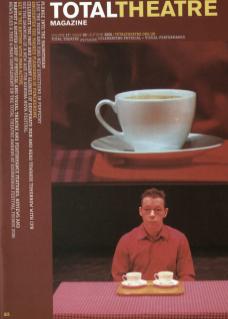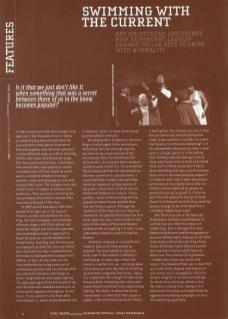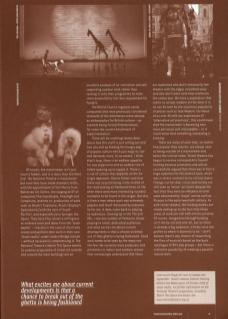Is it that we just don't like it when something that was a secret between those of us in the know becomes popular?
In 2002 myself and 1500 other people of all ages sat in the Place des Armes in Calais on raked seating and watched Royal de Luxe present a show about China which featured puppets and machines operated in many different ways, as well as startling effects that came from below the stage. The show used broad humour, stereotypes and unexpected visual poetry to convey a complex view of China. Royal de Luxe's work is a balance between creating a dramatic scene and showing you how they created that scene. The company uses very simple forms of theatre to enthuse their audiences. Their success in achieving this was proved by the ecstatic reaction they received at the end of the show.
In 2005 myself and about 1500 other people of all ages sat in the Lyceum Theatre, London and watched The Lion King. The use of puppets, the extremely effective stage-craft (from above and below the stage) and colourful spectacle was remarkably similar in approach to Royal de Luxe, as was the emphasis on theatricality. How they told the story was as important as what the story was about. You could see how they created theatre; there was no hiding behind computerised effects. In fact, at one point you are convinced they are using some sort of animated projection and are amazed when you realise it's all done with things on poles, hung material and simple lighting. This approach again fired the audience up, and the show was rewarded with bursts of enthusiastic applause throughout its two hours. If you wanted to illustrate what total theatre is, where all the elements are in harmony, either of these shows would provide perfect examples.
Yet despite their similarities, The Lion King is firmly lodged in the mainstream while Royal de Luxe, although popular, are seen as very much outside of the mainstream. Now I've mentioned ‘the mainstream', it's only fair that I attempt to define what I think it is. It's a minefield. The dictionary defines the mainstream as the main current of a cultural trend – I would add that it tends to be work that makes an impact on a large section of the public, many/most of whom are not traditional followers of culture. I must confess, I went to The Lion King with my prejudices about Disney and the West End very firmly in place. Although the aesthetics of the show were at times too smooth for me and the Elton John/Tim Rice tunes leave me cold, I have to admit that some of the ideas, effects and theatre worked as well as anything I've seen. It was undeniably a fabulous piece of popular theatre.
A theatre company or solo performer needs to play to as many people as possible. You want people to like your work, even if the content is difficult or challenging. In some ways a West End venue is a perfect set-up – no taking down and putting up every day and no travelling up and down congested motorways. Being in a single place for a length of time allows the possibility of working with untourable heavy theatre machinery and sophisticated lighting. Yet what is it about the terms 'mainstream' or 'West End' that causes a judder in the artistically sensitive? There's a feeling that the company you saw in that tiny art centre has lost everything that made it special when it transfers to a West End theatre. Is it the slick marketing? Is it the adjustments necessary to make a show work in a larger space? Is it the feeling that clichéd producers have got hold of ideas which were once so fresh and milked them dry? Is it that we just don't like it when something that was a secret between those of us in the know becomes popular? Is it that we don't like it when the actors/ performers of the original leave after six months and are replaced by people we perceive to be not as good? Is it that we don't like the audiences who go to these shows? Is it because we think that anything popular enough to be in the West End is inevitably middle-brow crap?
Ben Elton musicals or the Reduced Shakespeare Company would appear to confirm that yes, West End shows are indeed crap, but in amongst the Lloyd Webber blockbusters and the biographical musicals (Buddy Holly, Madness et al) have crept shows such as The Lion King whose choice of director (Julie Taymor) proved very inspired or Festen which features those sure-fire commercial ingredients – middle class hypocrisy, incest and racism. Shockheaded Peter was a show that you could easily imagine watching at an arts centre, but it managed to retain its artistic integrity in its new surroundings. For those of us who know where a show like that is coming from, seeing it in a plush West End venue accompanied by an aggressive marketing campaign can be a disorientating experience.
Of course, the mainstream isn't just tourist fodder, and it is more than the West End. The National Theatre is mainstream but even they have made dramatic shifts, with the appointment of Tom Morris from Battersea Art Centre, the staging at NT of companies like Improbable, Kneehigh and Complicite, and the co-production of work such as Shunt's Tropicana, Avanti Display's Hydromania (with the cast of South Pacific), and especially Jerry Springer the Opera. They have thus shown a willingness to embrace work and ideas from the 'lower depths' – literally in the case of Shunt who create and perform their work in their own 'Shunt Vaults' under London Bridge station – without necessarily compromising it. The National Theatre's Watch This Space events (a summer programme of street art outside and around the main building) are an excellent example of an institution actively supporting outdoor work rather than tacking it onto their programme to meet some accessibility tick-box requirement for funders.
The British Council regularly sends companies that were previously considered stalwarts of the alternative scene abroad as ambassadors for British culture – an example being Forced Entertainment, for some the current benchmark of experimentation.
There will be rumblings below deck about how this stuff is just selling out and how you end up feeding the hungry dog of popular culture which just wags its tail and demands more. To an extent, I think that's true, there is an endless appetite for new experience and an endless line of talent queuing up to supply it. There is a risk of culture that depends on the hit single approach. Dennis Potter said that there was no point being in the middle of the road looking at flattened forms of life when there were more interesting rounded examples to be found in the verges. But this is from a man whose work was extremely popular and much discussed by everyone. So for me, it does come back to playing to audiences. Growing up in the 70s and 80s, I saw any number of fantastic shows playing to small, dedicated audiences and what excites me about current developments is that a chance to break out of that ghetto is being fashioned. Good work needs to be seen by the many not the few. We currently have producers and promoters in indoor and outdoor venues that increasingly understand that there are audiences who don't necessarily like theatre with the edges smoothed away and who don't want work that reinforces the status quo. We have a population that seems to accept modern art for what it is, as can be seen by the enormous popularity of places such as Tate Modern. For those of us over 45 with our experiences of 'alternative art practices', this could mean that the mainstream is becoming ever more pervasive and inescapable – or it could mean that something interesting is brewing.
There are areas of work that, no matter how popular they may be, are always seen as being outside of a mainstream and below the critical radar. Street theatre has begun to receive increased Arts Council funding because promoters and artists successfully argued that there was in fact a huge audience for this kind of work, which was in direct contrast to its critical status. Change can be slow: circus and variety are still seen as 'minor' artforms despite the fact that they were an influence on and were advocated by 'major’ artists such as Picasso in the early twentieth century. As with street theatre, the funding bodies are slowly waking up to the fact that these areas of work are rich with artistic promise. Of course, recognition through funding isn't the be-all and end-all, but as there is already a big audience, it helps raise the profile to where it deserves to be. I don't believe there's any chance of staunching the flow of musicals based on the back catalogue of 80s pop groups – but there is a distinct possibility of creating a parallel mainstream.
Look out for Royal de Luxe in London this September. Shunt's Amaltos Saltone Starring Kittens and Wade opens 18 October 2005 at Shunt Vaults. For further information on the National Theatre's programme, including Watch This Space and Shunt, see www.nationaltheatre.org.uk


